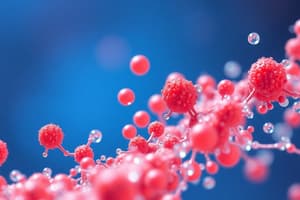Podcast
Questions and Answers
What is the primary role of the autoclave in hydrothermal synthesis?
What is the primary role of the autoclave in hydrothermal synthesis?
- To mix the materials thoroughly
- To cool the solution after synthesis
- To maintain high pressure and temperature conditions (correct)
- To dissolve the precursors in water
Which of the following is NOT an application of hydrothermal synthesis?
Which of the following is NOT an application of hydrothermal synthesis?
- Quantum computing chips (correct)
- Energy storage materials
- Nanoparticles
- Nanostructured materials
Which factor does NOT influence the hydrothermal synthesis process?
Which factor does NOT influence the hydrothermal synthesis process?
- Pressure
- Humidity (correct)
- Temperature
- Precursor concentration
What is one advantage of hydrothermal synthesis?
What is one advantage of hydrothermal synthesis?
During hydrothermal synthesis, precipitate formation occurs after:
During hydrothermal synthesis, precipitate formation occurs after:
Flashcards are hidden until you start studying
Study Notes
Hydrothermal Synthesis
- A method for synthesizing materials, particularly nanoparticles, nanorods, and other nanostructures, using a high-temperature aqueous solution.
- Involves dissolving precursors in water, heating the solution in a sealed vessel (autoclave) above the boiling point of water (up to 300°C), maintaining the temperature and pressure, and then cooling the solution.
- Advantages include its low cost, simplicity, ability to produce high-quality materials with controlled size and shape, flexibility in choosing precursors and reaction conditions, and environmentally friendly nature (using water as a solvent).
- Applications:
- Nanoparticles (e.g., metal oxides, quantum dots)
- Nanorods (e.g., metal oxides, semiconductors)
- Nanostructured materials (e.g., zeolites, metal-organic frameworks)
- Biomaterials (e.g., hydroxyapatite, calcium carbonate)
- Energy storage materials (e.g., battery electrodes)
- Catalytic materials
- Factors influencing synthesis:
- Temperature
- Pressure
- pH
- Precursor concentration
- Reaction time
- Surfactants or additives
Studying That Suits You
Use AI to generate personalized quizzes and flashcards to suit your learning preferences.




